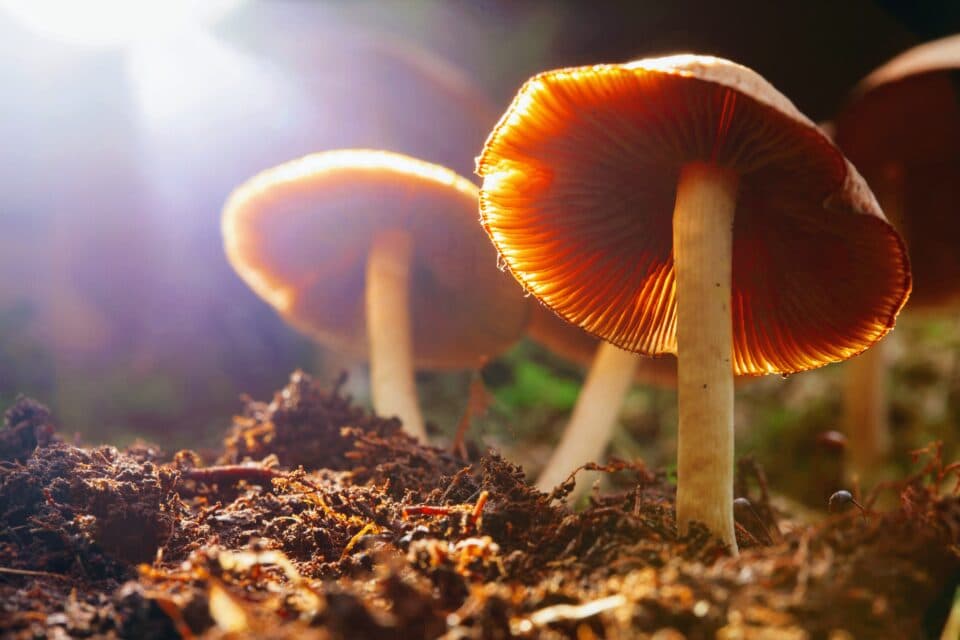Bruce Tobin became interested in psilocybin, the psychoactive compound in magic mushrooms, 10 years ago when he was approached by a woman who had been diagnosed with terminal cancer.
She was suffering from intense depression, anxiety and hopelessness and the prospect of imminent death.
Fortunately, good treatment sent her cancer into remission. Yet she continued to experience these agonizing psychological symptoms, and conventional medical options proved ineffective in curbing them.
“The cancer was behind her, but there was this constant fear that it was going to return,” said Tobin, a psychotherapist based in Victoria, B.C., who has been practising for 35 years.
After exhausting other options, the woman tried psilocybin mushrooms. In a short period of time, her perspective drastically improved.
“She reported great gains in optimism, spiritual well-being, quality of life and an increased sense of acceptance of her death, whenever that happens,” Tobin said.
Her experience is in line with recent studies that have shown how psilocybin can help terminal cancer patients cope with anxiety stemming from their diagnosis. Other emerging research is showing the potential of psychedelics, some of which have been granted “breakthrough therapy” status by the U.S. Food and Drug Administration, to possibly treat and cure a range of medical concerns from Alzheimer’s to depression to addiction.
Since his patients’ positive mushroom experience, Tobin has devoted himself to fighting for patient access to psilocybin and is willing to take his battle to the courts, similar to the way cannabis patients and advocates fought for access.
Tobin is part of a growing number of health-care providers and researchers around the world who are championing the possibilities of mushrooms and other psychedelics that have been banned in Canada and the U.S. since the 1970s, but are now in the midst of a renaissance.
This fall, the University of Toronto launched the Centre for Psychedelic Studies, which will host the world’s first clinical trials on microdosing psilocybin. It joins a number of other prominent institutions devoting resources to psychedelics research, including other research centres at Johns Hopkins University and Imperial College London.
And in the year since cannabis became legal for recreational use in Canada, the world of psychedelics has also been attracting a number of cannabis executives who see it as the next frontier for therapeutic innovation.
Meanwhile, there are competing forces emerging across the country, differentiated by those who are willing to break the law to provide access to psychedelics and those who see legal channels as the best way forward.
In 2017, Tobin submitted an application to Health Canada requesting a special exemption to the current drug laws that would allow him to procure synthetic psilocybin and provide it to a group of terminal cancer patients who are experiencing end-of-life distress for which other treatments haven’t worked.
“They become depressed, demoralized, and life seems to lose its meaning. There’s no sense of future,” Tobin said.
Including his group of patients, Tobin estimates there are nearly 3,000 people in Canada for whom medical psilocybin could be beneficial.
He’s revised his application to Health Canada a number of times over the years, obtaining letters of support from members of psilocybin research teams across the United States, including from Johns Hopkins University.
But he says it’s been months since he’s heard from the federal health agency. If he gets rejected or doesn’t receive a response, Tobin says he plans to take the matter to court sometime next year.
“We’re talking about several thousands of Canadians that are suffering every day that treatment continues to be withheld from them,” Tobin said. “Treatment delayed is treatment denied.”
Health Canada would not comment on the specifics of the exemption applications that it receives, citing privacy reasons, but said it has received two applications regarding psilocybin, including one from 2017.
Tobin’s arguments in favour of providing psilocybin are similar to those of the medical cannabis advocates whose successful court battles eventually forced Health Canada to create special regimes to allow patients to obtain licences to use and grow cannabis.
Tobin sees these precedents as laying the groundwork for his own case. However, he said he’s not in favour of psychedelics being decriminalized, as was done earlier this year in Denver, Colorado.
“I am not supporting the liberalization of psilocybin for spiritual or recreational purposes. I am confining my message to the medical use of psilocybin,” he said.
While Tobin is fighting for access for psilocybin on behalf of his patients, he’s clear that he’s not an “underground therapist.” The patients are responsible for obtaining the substance themselves.
“I’ve always had the sense that if I go to court and I’ve been engaged in illegal activities, that could come back to bite me,” Tobin said. “So I’ve played the squeaky clean role here. But I’m not going to go away.”
Dana Larsen is taking the opposite approach.
The longtime cannabis rights advocate from Vancouver is known for protesting against drug laws by flagrantly violating them, and he has now set his sights on psychedelic mushrooms. While he shares Tobin’s goal of ensuring medical access to psilocybin, he eventually would like to see it fully legalized or decriminalized.
This summer, he opened an illegal mail-order website, The Medicinal Mushroom Dispensary, and plans to open a physical space next year where people can consume psychedelics with supervision.
“Expanding into psychedelics is a really natural progression. The time is right,” Larsen said.
His is one of a number of illicit online mushroom stores in Canada, but Larsen appears to be the only operator who’s open about his operation.
Other dispensaries have been ordered by Health Canada to cease operations altogether. In July, the health agency sent a letter to Mungus.ca stating that its operations violated Canada’s drug laws.
“You are required to immediately suspend all activities in relation to psilocybin mushroom and to remove any content from your website related to the sale of a controlled substance,” states the letter, posted on the Mungus.ca site.
Health Canada confirmed in an email that the Mungus letter is authentic and that it is one of a total of 6 such letters it has sent to websites offering psilocybin.
For Larsen, who has faced numerous cannabis charges, his mushroom dispensary is part of a broader push to normalize psychedelics and eventually get them legalized.
“The civil disobedience movement was not the only reason cannabis was legalized in Canada, but I don’t think it would have happened without it,” Larsen said. “And I think we’re going to see similar things with mushrooms and psychedelics.”
Larsen’s online venture offers its members a microdosing “regimen,” which, in this case, is a low dose of mushrooms meant to be taken a couple times a week. This is different from taking a dose large enough to induce a trip, which can last several hours.
Like many illegal or so-called “grey market” dispensaries that operated before cannabis legalization, Larsen says he will only sell to people located in Canada who provide proof of a diagnosis or a recommendation for psilocybin from a health-care practitioner.
This includes providing the substance to minors “if the parents consent in certain circumstances.”
Larsen says the mushroom dispensary’s membership has swelled to more than 1,000 people in the six months since he launched the site.
“It’s growing faster than when I was doing cannabis stuff, starting dispensaries and other projects 10 years ago,” he said. “But cannabis itself was easier to access to regular people, but mushrooms, especially microdoses, you have to know somebody.”
Former cannabis executives and researchers who are delving into psychedelics say that rigorous science and regulations must be pursued first to do justice to the burgeoning industry.
“My argument always has been that cannabis exists everywhere. Ignoring it helps illegal operators. It’s the exact same thing with psychedelics,” said Bruce Linton, formerly the co-CEO of cannabis giant Canopy Growth, who recently joined Toronto-based medical psychedelic firm Mind Medicine Inc.
“The job of the government is not to ignore. In this space, they should regulate, educate and monetize,” Linton, who still has one foot in the cannabis realm, said from a cannabis conference in Las Vegas. “Anybody who is opening illicit activities simply gives a stronger, compelling argument to the government to just smarten up.”
Linton’s company, also known as “Mindmed,” announced in September that it had invested in a molecule based on ibogaine, another psychedelic, to pursue its potential as a form of treatment for opioid addiction.
The company raised more than $6 million in new investment earlier this year, and it’s planning to go public in Canada in 2020.
Though Linton says the current scientific research around psychedelics is exciting and is in many ways more advanced than the science around cannabis, he doubts there will be a flood of cannabis execs like him entering the sector. To him, it requires harder work and more complicated ideas.
“You’re more likely to see researchers come out of the woodwork if there’s a proper way they can present themselves and not have the concern of access to capital or career,” Linton said.
Over the last 40 to 50 years, he said, much of the research has been “done in the shadows.”
“Now you have to be smart and pick jurisdictions where you can get work done and not be out of sight. What you don’t want to say is, ‘I’m going to change the rules in Canada and then do the work.’ No, go do the work and use the work to change the rules.”






